#Slovenian
Text
Bria brialarson utter_apparatus rotten_campaign
#bria#brialarson#larson#amazing breasts#big tiddy wife#cutie w a bootie#great breasts#huge titts#perfect breast#huge tiddies#huge natural melons#big tiddy committee#anna bianca#utter_apparatus#rotten_campaign#slovenian#utter#apparatus#rotten#campaign
5K notes
·
View notes
Text
Bria brialarson utter_apparatus rotten_campaign
#bria#brialarson#utter_apparatus#rotten_campaign#slovenian#cutie w a bootie#great breasts#perfect breast#amazing breasts#huge titts#big tiddy committee#big tiddy wife#huge natural melons#huge tiddies#sexy titts#larson#utter#apparatus#rotten#campaign
3K notes
·
View notes
Text
Brie brielarson
#brie#brielarson#brialarson#utter apparatus#utter_apparatus#rotten_campaign#slovenia#slovenian#big tiddy gf#hot as fuck#huge bewbs#big t1ts#huge titts#so hot 🔥🔥🔥#thick as fuck#thickaf#yulia nova#lillyflsr
1K notes
·
View notes
Text
Bria brialarson utter_apparatus rotten_campaign
#bria#brialarson#utter_apparatus#rotten_campaign#larson#utter#apparatus#rotten#campaign#slovenian#beautiful lips#cleavalicous#hot content#hot bewbs#ready#tig ol bitties#under b00b#midriff
2K notes
·
View notes
Text
#poll#polls#languages#language#denmark#danish#sweden#swedish#finland#finnish#iceland#icelandic#estonia#estonian#norway#norwegian#russia#russian#latvia#latvian#germany#german#slovenia#slovenian#ireland#irish#italy#italian#sorry... there's no many of these/all of these option 😭 this will be hard for me too!#learning
2K notes
·
View notes
Text

The Chemist (Dr. Ana Mayer Kansky), 1932 by Henrika Šantel (Slovenian, 1874--1940)
1K notes
·
View notes
Text

Bograč
#food#recipe#dinner#stew#bograc#potaotes#onions#peppers#bell pepper#venison#beef#pork#thyme#garlic#marjoram#paprika#caraway#gluten free#dairy free#slovenian
530 notes
·
View notes
Text
Počasi in Slovenian means "slow" but in Czech počasí means "weather" and in Slovenian "weather" is vreme but in Russian "время" (vremya) means "time" and this is exactly why I shouldn't have studied two Slavic languages at the same time but here I am
591 notes
·
View notes
Text

Ricotta Lemon Potica
#ricotta#lemon#potica#pastry#dessert#bundt#easter#christmas#european#slovenian#recipe#yeast#jernejkitchen
167 notes
·
View notes
Text
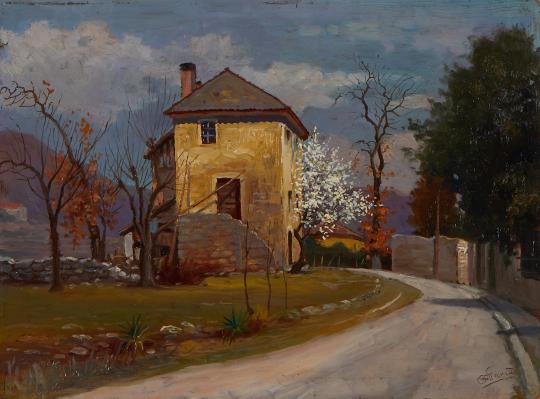
Rudolf Ernst Marčić (1882 - 1960) - Village Street in Spring. Oil on cardboard.
225 notes
·
View notes
Text
Brie brielarson
#brie#brielarson#brialarson#amazing breasts#big tiddy wife#cutie w a bootie#great breasts#huge titts#perfect breast#huge tiddies#huge natural melons#big tiddy committee#anna bianca#slovenian#utter_apparatus#utter apparatus#rotten campaign#rotten_campaign
1K notes
·
View notes
Text
Brie brielarson
#brie#brielarson#cutie w a bootie#great breasts#perfect breast#amazing breasts#huge titts#big tiddy committee#big tiddy wife#huge natural melons#huge tiddies#sexy titts#slovenian#utter apparatus#utter_apparatus#rotten_campaign#rotten campaign
701 notes
·
View notes
Text
Brie brielarson
#brie#brielarson#big tiddy gf#hot as fuck#huge bewbs#big t1ts#huge titts#so hot 🔥🔥🔥#thick as fuck#thickaf#yulia nova#lillyflsr#utter apparatus#utter_apparatus#rotten campaign#rotten_campaign#slovenian#bria#larson
633 notes
·
View notes
Text
Brie brielarson
#brie#brielarson#brialarson#beautiful lips#cleavalicous#hot content#ready#hot bewbs#tig ol bitties#under b00b#midriff#utter apparatus#utter_apparatus#rotten campaign#rotten_campaign#slovenian
316 notes
·
View notes
Text

Bled by Anton Karinger
#bled castle#slovenia#art#anton karinger#bled#slovenian#medieval#castle#castles#lake bled#history#europe#european#landscape#julian alps#middle ages#romantic#mountains#trees#slovene
1K notes
·
View notes
Text

Joker Out interviews with Slovenian subtitles
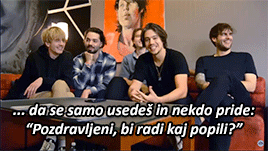
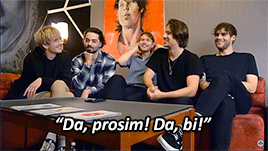
Want to learn Slovenian with Joker Out? Look no further as a lot of Joker Out Subs videos have Slovenian subtitles (as well as English and several other languages).
However, one thing you need to keep in mind is that Slovenian is a language where the formal form of it that we learn in school and that is used in official capacity, and the informal form of it that we use in everyday life, are two separate things that can actually have a lot of differences (and that's without even getting into the about 50 different dialects that exist in Slovenian). Formal Slovenian, called 'knjižna slovenščina' ('literary Slovenian'), is only used in formal writing and when speaking in official capacity, such as, for example, a politician giving a speech at an event. No one uses it in casual speech, it would sound very stiff and awkward. In casual conversations, we use what we call 'pogovorna slovenščina' ('colloquial Slovenian'), which can then be further divided into colloquial literary Slovenian, slang, dialect, etc., but that would require an entire post for itself.
It can be a little complicated, but no worries – we got you! You can find detailed explanations about the common informal words and informal grammar you'll hear and see in our videos in this post.
If you’ve already tried to learn some Slovenian, and then watched a Joker Out interview, you probably already noticed that they are not speaking the formal version of the language that you’ve been learning. They are shortening a lot of words, they use the informal version of some of the words, they do not always follow grammar rules and so on.
However, the subtitles are written in formal Slovenian as much as possible to make it easier for learners of Slovenian to follow the interviews and learn the correct form of the words. In spite of that the subtitles reflect colloquial speech, so do not use them to learn proper Slovenian grammar!
Below is a list of some main differences between formal Slovenian and colloquial speech that you will notice in JOS videos.
Informal forms written as they are spoken
Some informal forms and pronunciations can be found in the Slovenian dictionary https://fran.si/, so we decided to keep the spoken/informal versions in the subtitles. These forms would not normally be used in formal written texts.

Informal forms written as in formal Slovenian
Most non-standard forms and pronunciations in Slovenian are only found in casual speech and informal written texts. They often depend on the dialect of the speakers. Most of the forms in Joker Out interviews are typical of the dialects spoken in Ljubljana and the surrounding areas.
The speakers often shorten the words by leaving out the final vowels and/or other sounds, and they sometimes use the colloquial version of the words. Especially the endings on some forms of the verbs (infinitives, participles) are routinely shortened.
In all of these cases the form used in the subtitles is the formal version, e.g. “pol” is written as “potem”.
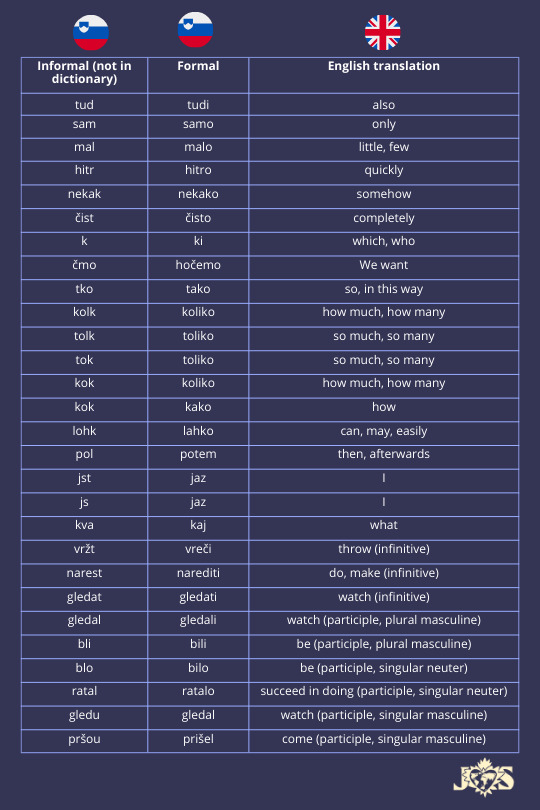
Non-standard grammar
In informal speech speakers often use non-standard Slovenian grammar. Sometimes the non-standard use is typical of a certain variety, while sometimes it is because it is easy for speakers to make grammatical errors during informal conversations.
Some areas where non-standard grammar occurs in JOS videos are noun endings, verb forms and word order. In the subtitles, the word order is written as used by the speakers, but nouns and verbs are always written in the correct grammatical form.
Noun cases
Slovenian uses case endings on nouns, to express which role a noun is playing in a sentence. If a noun is modified by an adjective and/or a demonstrative or possessive pronoun, these also have to be in the same case.
An example of non-standard use of cases that occurs in JOS videos is the use of the ending “‑emu” instead of “‑em” on singular masculine pronouns and adjectives when used in connection with certain prepositions. This phenomenon is called “mukanje” (which literally means “mooing”) referring to the fact that these forms end in “mu”.
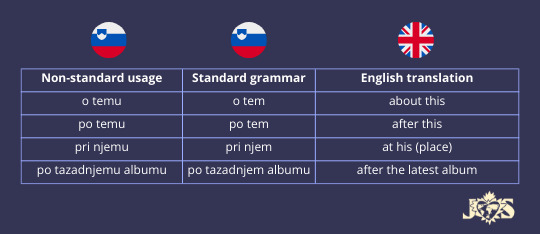
Verb forms
Slovenian uses verb endings to express person, number, tense, aspect, gender... Sometimes speakers use non-standard forms typical of a certain variety.
In JOS videos there are a couple of examples where a different ending is used on a verb (“‑em” instead of “‑im”) or a different verb is used altogether (the verb “moči” meaning “can” instead of “morati” meaning “must”).
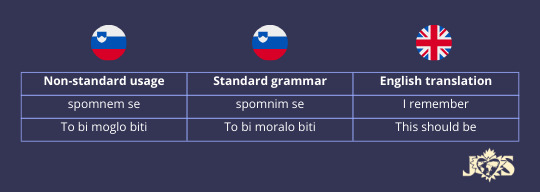
Word order
Slovenian has a fairly free word order, but there are some rules, especially about which words occur in the second position in a sentence and about the order of clitics (pronouns, auxiliaries, negative adverbs). Below is also an example from a JOS video, where the participle “bilo” should not be at the end of the sentence but after the auxiliary “je”.

For more amazing resources with various dictionaries (collocations, example sentences, synonyms...) visit this website: https://www.cjvt.si/en/tools-and-resources/dictionaries-and-lexicons/
Slovenian proofreading and examples by TWT coffeebiscuit
118 notes
·
View notes